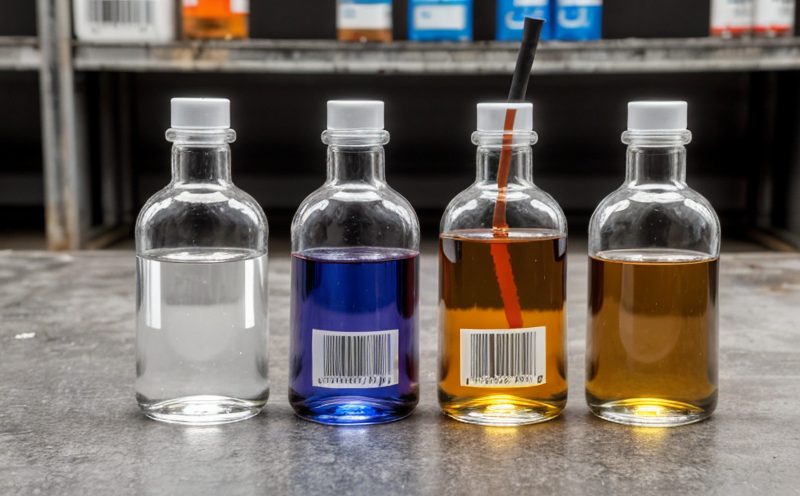ISO 4892 Weathering Stability Testing of Plastics
The ISO 4892 series of standards provides a comprehensive framework for assessing the resistance of plastics to various environmental factors that can lead to degradation. Among these, weathering stability testing is crucial for ensuring the longevity and performance of plastic products in outdoor environments. This service focuses on the specific ISO 4892-3:2016 standard, which deals with high temperature and humidity accelerated weathering (HTHWA) tests.
The purpose of this test is to evaluate how well a plastic material withstands exposure to ultraviolet radiation, heat, moisture, and other environmental factors that can cause degradation. The results help manufacturers ensure their products meet specific quality standards for durability and performance in real-world conditions.
During an ISO 4892-3 weathering test, the specimen is subjected to artificial sunlight (UV lamps) combined with high humidity and elevated temperatures. This simulates prolonged exposure to natural elements such as sunshine, rain, and humidity which can cause plastic materials to degrade over time.
The test typically lasts several weeks or months depending on the desired exposure level. Specimens are placed in a chamber where they are exposed to UV lamps that emit light mimicking solar radiation. The temperature inside the chamber is maintained at 50°C, and relative humidity can be adjusted up to 98%. The combination of these factors accelerates the aging process significantly compared to natural outdoor conditions.
It's important for manufacturers to understand the specific parameters required by ISO 4892-3. These include the type of lamp used (typically xenon arc lamps), the wavelength range, and the duration of exposure. The test results are reported based on changes in color, glossiness, mass loss, and other physical properties over time.
The specimen preparation is critical to achieving accurate results. Clean specimens cut from the same batch should be used for testing. Care must also be taken not to introduce any external variables that could affect the outcome of the test. This includes ensuring consistent orientation during exposure and avoiding contamination by fingerprints or other substances.
Once the test is completed, detailed reports are generated summarizing the changes observed in the specimen properties before and after testing. These reports provide valuable insights into the stability and durability of the plastic material under weathering conditions. This information can be used to improve product design and enhance overall quality assurance processes.
The ISO 4892-3 test is widely recognized for its reliability in predicting long-term performance of plastics exposed to outdoor environments. By following these rigorous protocols, manufacturers can ensure their products meet stringent quality standards while maintaining competitive edge in the market.
Understanding the nuances of this testing method allows stakeholders like quality managers and compliance officers to make informed decisions about product development and manufacturing processes. For R&D engineers and procurement teams, knowledge of weathering stability tests is essential for selecting appropriate materials that can withstand harsh environmental conditions effectively.
Eurolab Advantages
EuroLab offers unparalleled expertise in conducting ISO 4892-3 weathering stability testing. Our state-of-the-art facilities are equipped with advanced instrumentation capable of replicating real-world environmental conditions accurately and precisely.
We employ highly qualified professionals who have extensive experience in performing these tests according to international standards. This ensures that every test conducted meets the highest levels of accuracy and reliability.
Our comprehensive services extend beyond just conducting the tests; we also provide detailed reports and recommendations based on our findings, helping clients understand where improvements can be made in their product designs or manufacturing processes.
The benefits of choosing EuroLab for your ISO 4892-3 weathering stability testing needs are numerous. Firstly, we offer fast turnaround times without compromising on the quality of results. Secondly, our experienced team will guide you through each step of the process from initial consultation to final report delivery.
Additionally, EuroLab provides additional services such as accelerated aging tests using different environmental conditions if required by your specific application needs. We also offer consultancy services where our experts can help tailor testing protocols specifically for your products or materials.
Why Choose This Test
Selecting the right type of weathering test is crucial when developing new plastic products intended for outdoor use. The ISO 4892-3:2016 standard is particularly well-suited because it offers a realistic simulation of long-term exposure to environmental factors like sunlight, heat, and humidity.
One key advantage of this test is that it allows manufacturers to identify potential weaknesses in their materials early on during the development phase. By identifying these issues before production begins, significant cost savings can be achieved as corrective actions can be implemented earlier rather than after launching a product into market.
Another benefit is improved product quality and customer satisfaction since products that pass this rigorous test are more likely to perform consistently over time. This enhances brand reputation among consumers who value durability and reliability.
For companies operating globally, adhering to international standards like ISO 4892-3 ensures compliance with global regulatory requirements which can streamline product approval processes in different countries.
The test also aids in meeting sustainability goals by encouraging the use of more durable materials that last longer without requiring frequent replacements. This reduces waste and contributes positively towards environmental conservation efforts.
Quality and Reliability Assurance
Ensuring high quality and reliability in plastic products is paramount for manufacturers aiming to maintain their competitive edge in today's market. Conducting ISO 4892-3 weathering stability tests plays a crucial role in achieving this goal.
The test helps identify any flaws or shortcomings within the material early on, allowing corrective measures to be implemented before production starts. This not only improves product quality but also reduces costly recalls and returns later down the line.
Moreover, passing such tests demonstrates commitment to maintaining consistent performance standards across all batches produced by a company. It builds trust with customers who appreciate knowing that they are getting consistently high-quality products from reliable sources.
The results of these tests also contribute significantly towards meeting regulatory requirements set forth by various authorities worldwide. Meeting these standards increases the likelihood of successful product launches and broader market acceptance.





